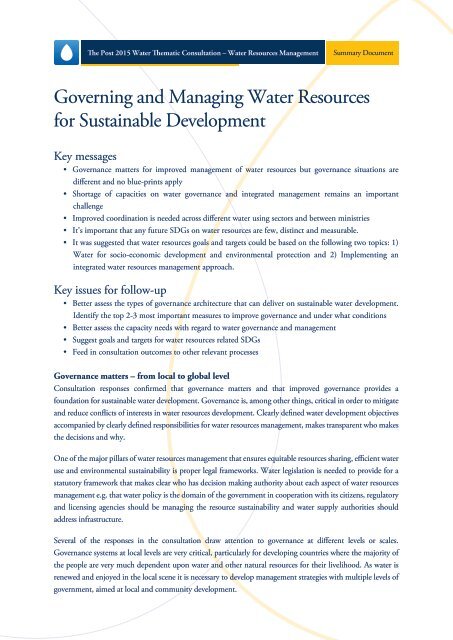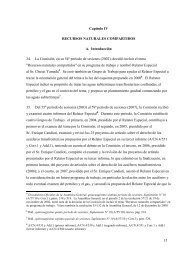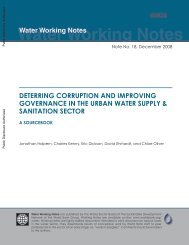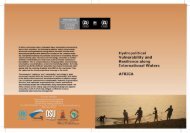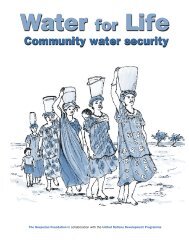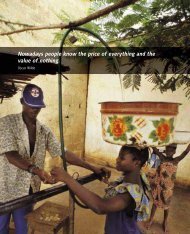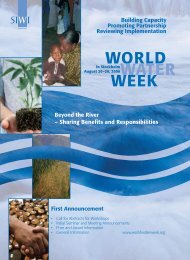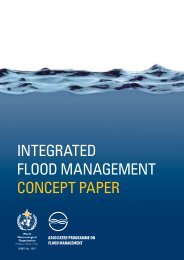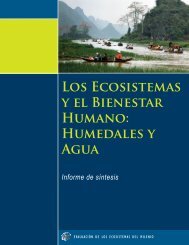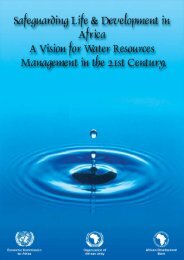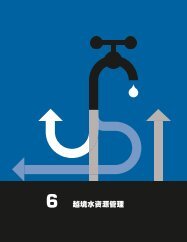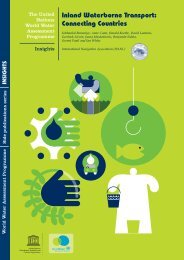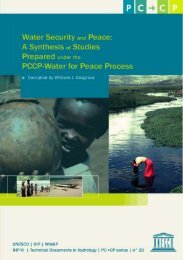Governing and Managing Water Resources for ... - UN-Water
Governing and Managing Water Resources for ... - UN-Water
Governing and Managing Water Resources for ... - UN-Water
You also want an ePaper? Increase the reach of your titles
YUMPU automatically turns print PDFs into web optimized ePapers that Google loves.
The Post 2015 <strong>Water</strong> Thematic Consultation – <strong>Water</strong> <strong>Resources</strong> Management<br />
Summary Document<br />
<strong>Governing</strong> <strong>and</strong> <strong>Managing</strong> <strong>Water</strong> <strong>Resources</strong><br />
<strong>for</strong> Sustainable Development<br />
Key messages<br />
• Governance matters <strong>for</strong> improved management of water resources but governance situations are<br />
different <strong>and</strong> no blue-prints apply<br />
• Shortage of capacities on water governance <strong>and</strong> integrated management remains an important<br />
challenge<br />
• Improved coordination is needed across different water using sectors <strong>and</strong> between ministries<br />
• It’s important that any future SDGs on water resources are few, distinct <strong>and</strong> measurable.<br />
• It was suggested that water resources goals <strong>and</strong> targets could be based on the following two topics: 1)<br />
<strong>Water</strong> <strong>for</strong> socio-economic development <strong>and</strong> environmental protection <strong>and</strong> 2) Implementing an<br />
integrated water resources management approach.<br />
Key issues <strong>for</strong> follow-up<br />
• Better assess the types of governance architecture that can deliver on sustainable water development.<br />
Identify the top 2-3 most important measures to improve governance <strong>and</strong> under what conditions<br />
• Better assess the capacity needs with regard to water governance <strong>and</strong> management<br />
• Suggest goals <strong>and</strong> targets <strong>for</strong> water resources related SDGs<br />
• Feed in consultation outcomes to other relevant processes<br />
Governance matters – from local to global level<br />
Consultation responses confirmed that governance matters <strong>and</strong> that improved governance provides a<br />
foundation <strong>for</strong> sustainable water development. Governance is, among other things, critical in order to mitigate<br />
<strong>and</strong> reduce conflicts of interests in water resources development. Clearly defined water development objectives<br />
accompanied by clearly defined responsibilities <strong>for</strong> water resources management, makes transparent who makes<br />
the decisions <strong>and</strong> why.<br />
One of the major pillars of water resources management that ensures equitable resources sharing, efficient water<br />
use <strong>and</strong> environmental sustainability is proper legal frameworks. <strong>Water</strong> legislation is needed to provide <strong>for</strong> a<br />
statutory framework that makes clear who has decision making authority about each aspect of water resources<br />
management e.g. that water policy is the domain of the government in cooperation with its citizens, regulatory<br />
<strong>and</strong> licensing agencies should be managing the resource sustainability <strong>and</strong> water supply authorities should<br />
address infrastructure.<br />
Several of the responses in the consultation draw attention to governance at different levels or scales.<br />
Governance systems at local levels are very critical, particularly <strong>for</strong> developing countries where the majority of<br />
the people are very much dependent upon water <strong>and</strong> other natural resources <strong>for</strong> their livelihood. As water is<br />
renewed <strong>and</strong> enjoyed in the local scene it is necessary to develop management strategies with multiple levels of<br />
government, aimed at local <strong>and</strong> community development.
The Post 2015 <strong>Water</strong> Thematic Consultation – <strong>Water</strong> <strong>Resources</strong> Management<br />
Summary Document<br />
Lack of capacity – a major challenge in managing water<br />
Lack of capacity came up in the consultation as one of the key challenges in managing water at national <strong>and</strong><br />
local level. A country might have most management tools <strong>and</strong> systems in place, such as a water policy, a<br />
water billing system, an IWRM plan <strong>and</strong> institutions. However, if there is limited capacity to implement<br />
<strong>and</strong> monitor water use, assess the resources <strong>and</strong> update the in<strong>for</strong>mation system, water management will not<br />
be fully realised.<br />
Another challenge that came up was the management at local levels. The management at the local level needs<br />
to be strengthened, both <strong>for</strong> municipalities <strong>and</strong> communities. There also needs to be mechanisms to<br />
facilitate cross-relations between the countryside <strong>and</strong> the city, to avoid increasing pollution of water bodies<br />
<strong>and</strong> unsustainable outtakes of surface- <strong>and</strong> groundwater.<br />
Reluctance of water users to cooperate, the lack of funding to maintain <strong>and</strong> improve hydrologic networks<br />
<strong>and</strong> the lack of political will are examples of other challenges. Moreover, politicians can point to water<br />
supply pipelines, tanks etc. in their campaign <strong>for</strong> re-election, but fail to underst<strong>and</strong> that good water<br />
resources management is critical to sustaining a reliable <strong>and</strong> safe water supply.<br />
Capacity building has to be targeted <strong>and</strong> linked to needs so it translates into improved water resources<br />
management.<br />
<strong>Water</strong> resources management contributing to sustainable development – coordination<br />
between sectors needed<br />
There was a general agreement in the consultation that governance <strong>and</strong> integration are critical <strong>for</strong> managing<br />
the world's water resources, if we are to achieve a more sustainable <strong>for</strong>m of development. A lack of joined<br />
up thinking in government is a barrier to water resources management <strong>and</strong> thus development. To ensure<br />
that development is sustainable <strong>for</strong> present <strong>and</strong> future generations coordination across different<br />
constituencies <strong>and</strong> sectors needs to be improved. <strong>Managing</strong> water resources thus needs an integrated<br />
approach that makes sure policy, plans, laws, pricing, subsidies etc. are not contradictory. By working in<br />
narrow traditional sectors water issues will not be properly addressed.<br />
Participants recognised that in all countries everything depends on water - energy, food, industry, health,<br />
environment <strong>and</strong> so on. Coordination across sectors, as well as taking account of environmental <strong>and</strong> climate<br />
issues, is complex. It requires a new way of thinking <strong>and</strong> governing. We are still stuck in a rigid sector<br />
approach with institutions operating in isolation. Better policy cohesion is required between these<br />
institutions, what has been called joined-up government. Addressing such issues is challenging <strong>and</strong> political<br />
but complexity can be managed if the political will is present. Innovative thinking, institutional change <strong>and</strong><br />
finance are also essential.<br />
<strong>Water</strong> resources management will be a critical issue in the future in most parts of the world, but it is usually<br />
low on the political agenda as it is not seen as directly related to growth. More advocacy is needed in<br />
countries so governments sign up to water as a major theme in the Sustainable Development agenda after<br />
2015.
The Post 2015 <strong>Water</strong> Thematic Consultation – <strong>Water</strong> <strong>Resources</strong> Management<br />
Summary Document<br />
A sustainable development goal that explicitly considers water resources would be useful -<br />
how could it be monitored <strong>and</strong> reported?<br />
The ability to determine the carbon footprint has contributed substantially to create commitments to reduce<br />
the impacts of greenhouse gases. Similarly, universally accepted indicators could attract more attention to<br />
the care of water.<br />
Existing MDG indicators <strong>for</strong> water access should be improved, <strong>for</strong> example to take account of rural-urban<br />
disparities but. The challenge today is not only access to services but water resources management to ensure<br />
the availability of quality resources in time <strong>and</strong> space <strong>and</strong> practices to maintain quality.<br />
It was suggested that water resources goals <strong>and</strong> targets could be based on the following two topics:<br />
• <strong>Water</strong> <strong>for</strong> socio-economic development <strong>and</strong> environmental protection.<br />
• Implementing an integrated water resources management approach.<br />
More work is needed to develop indicators to capture these two topics <strong>and</strong> set up a system to monitor <strong>and</strong><br />
report on them.


